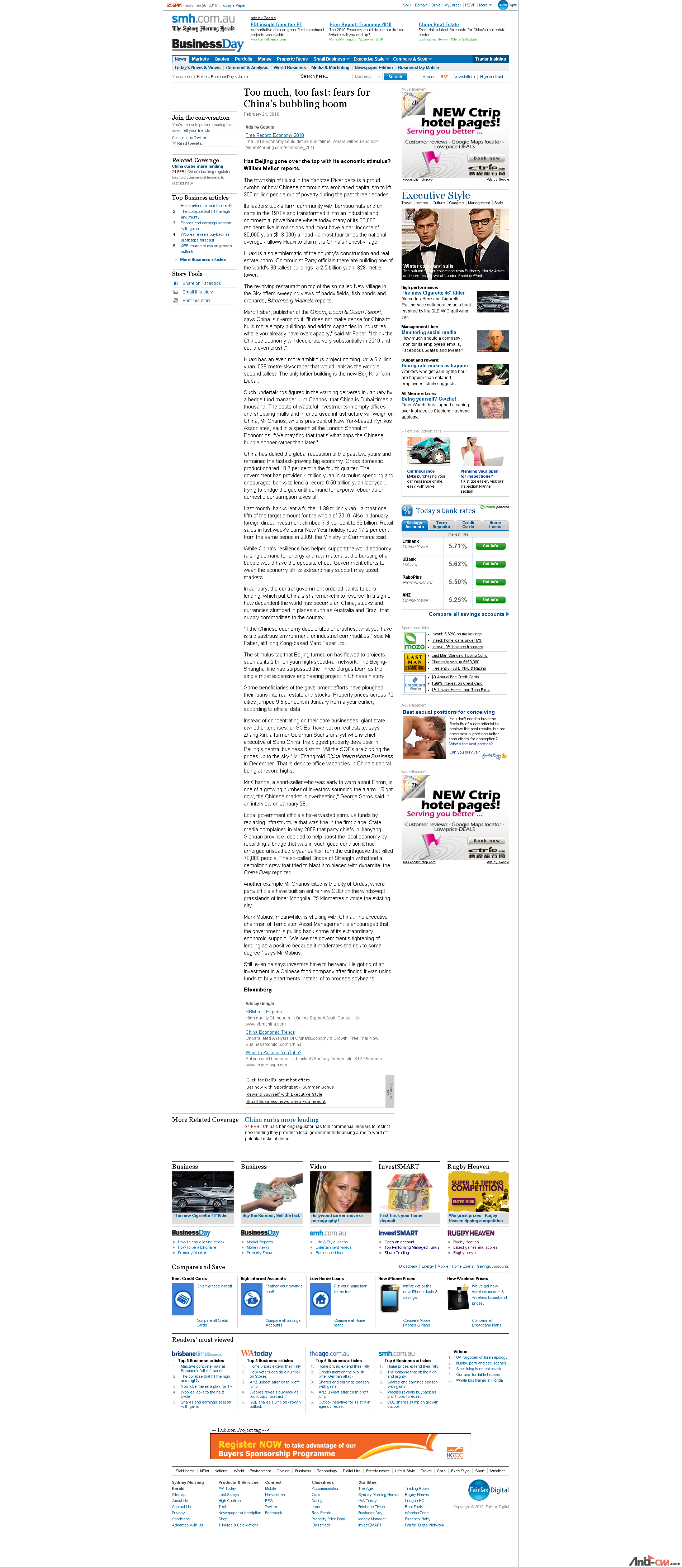|
|
【原文链接】http://www.smh.com.au/business/t ... -20100223-p0ox.html
【原文】
Has Beijing gone over the top with its economic stimulus? William Mellor reports.
The township of Huaxi in the Yangtze River delta is a proud symbol of how Chinese communists embraced capitalism to lift 300 million people out of poverty during the past three decades.
Its leaders took a farm community with bamboo huts and ox carts in the 1970s and transformed it into an industrial and commercial powerhouse where today many of its 30,000 residents live in mansions and most have a car. Income of 80,000 yuan ($13,000) a head - almost four times the national average - allows Huaxi to claim it is China's richest village.
Huaxi is also emblematic of the country's construction and real estate boom. Communist Party officials there are building one of the world's 30 tallest buildings, a 2.5 billion yuan, 328-metre tower.
The revolving restaurant on top of the so-called New Village in the Sky offers sweeping views of paddy fields, fish ponds and orchards, Bloomberg Markets reports.
Marc Faber, publisher of the Gloom, Boom & Doom Report, says China is overdoing it. "It does not make sense for China to build more empty buildings and add to capacities in industries where you already have overcapacity," said Mr Faber. "I think the Chinese economy will decelerate very substantially in 2010 and could even crash."
Huaxi has an even more ambitious project coming up: a 6 billion yuan, 538-metre skyscraper that would rank as the world's second tallest. The only loftier building is the new Burj Khalifa in Dubai.
Such undertakings figured in the warning delivered in January by a hedge fund manager, Jim Chanos, that China is Dubai times a thousand. The costs of wasteful investments in empty offices and shopping malls and in underused infrastructure will weigh on China, Mr Chanos, who is president of New York-based Kynikos Associates, said in a speech at the London School of Economics. "We may find that that's what pops the Chinese bubble sooner rather than later."
China has defied the global recession of the past two years and remained the fastest-growing big economy. Gross domestic product soared 10.7 per cent in the fourth quarter. The government has provided 4 trillion yuan in stimulus spending and encouraged banks to lend a record 9.59 trillion yuan last year, trying to bridge the gap until demand for exports rebounds or domestic consumption takes off.
Last month, banks lent a further 1.39 trillion yuan - almost one-fifth of the target amount for the whole of 2010. Also in January, foreign direct investment climbed 7.8 per cent to $9 billion. Retail sales in last week's Lunar New Year holiday rose 17.2 per cent from the same period in 2009, the Ministry of Commerce said.
While China's resilience has helped support the world economy, raising demand for energy and raw materials, the bursting of a bubble would have the opposite effect. Government efforts to wean the economy off its extraordinary support may upset markets.
In January, the central government ordered banks to curb lending, which put China's sharemarket into reverse. In a sign of how dependent the world has become on China, stocks and currencies slumped in places such as Australia and Brazil that supply commodities to the country.
"If the Chinese economy decelerates or crashes, what you have is a disastrous environment for industrial commodities," said Mr Faber, at Hong Kong-based Marc Faber Ltd.
The stimulus tap that Beijing turned on has flowed to projects such as its 2 trillion yuan high-speed-rail network. The Beijing-Shanghai line has surpassed the Three Gorges Dam as the single most expensive engineering project in Chinese history.
Some beneficiaries of the government efforts have ploughed their loans into real estate and stocks. Property prices across 70 cities jumped 9.5 per cent in January from a year earlier, according to official data.
Instead of concentrating on their core businesses, giant state-owned enterprises, or SOEs, have bet on real estate, says Zhang Xin, a former Goldman Sachs analyst who is chief executive of Soho China, the biggest property developer in Beijing's central business district. "All the SOEs are bidding the prices up to the sky," Mr Zhang told China International Business, in December. That is despite office vacancies in China's capital being at record highs.
Mr Chanos, a short-seller who was early to warn about Enron, is one of a growing number of investors sounding the alarm. "Right now, the Chinese market is overheating," George Soros said in an interview on January 28.
Local government officials have wasted stimulus funds by replacing infrastructure that was fine in the first place. State media complained in May 2009 that party chiefs in Jianyang, Sichuan province, decided to help boost the local economy by rebuilding a bridge that was in such good condition it had emerged unscathed a year earlier from the earthquake that killed 70,000 people. The so-called Bridge of Strength withstood a demolition crew that tried to blast it to pieces with dynamite, the China Daily reported.
Another example Mr Chanos cited is the city of Ordos, where party officials have built an entire new CBD on the windswept grasslands of Inner Mongolia, 25 kilometres outside the existing city.
Mark Mobius, meanwhile, is sticking with China. The executive chairman of Templeton Asset Management is encouraged that the government is pulling back some of its extraordinary economic support. "We see the government's tightening of lending as a positive because it moderates the risk to some degree," says Mr Mobius.
Still, even he says investors have to be wary. He got rid of an investment in a Chinese food company after finding it was using funds to buy apartments instead of to process soybeans.

|
boom, fears, Herald, Morning, Sydney, boom, fears, Herald, Morning, Sydney, boom, fears, Herald, Morning, Sydney
评分
-
1
查看全部评分
-
|